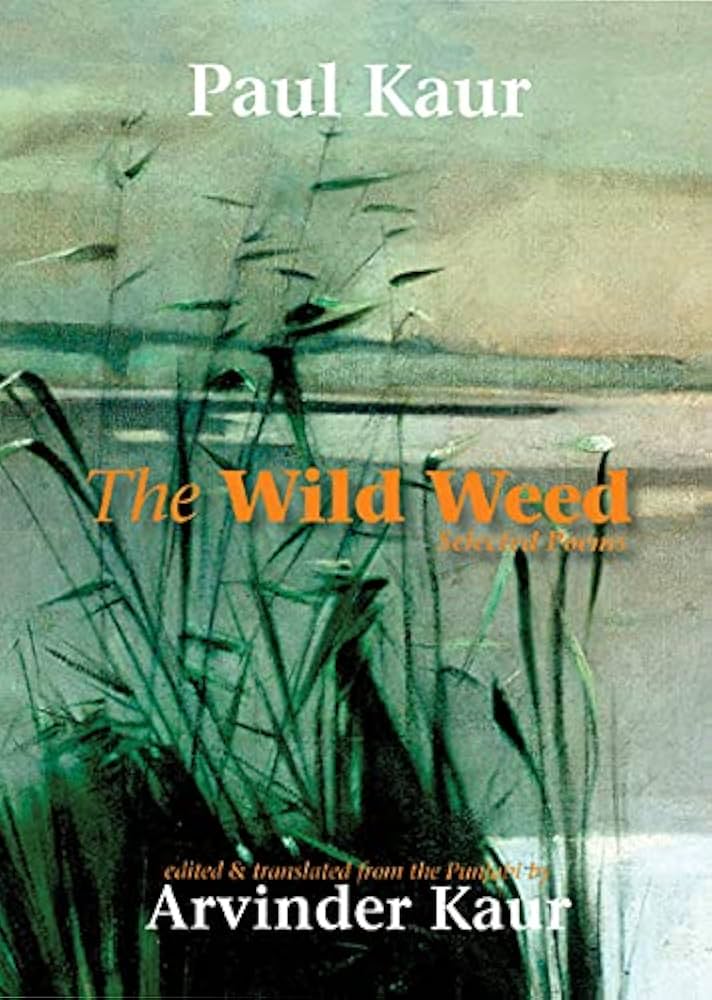BOOK REVIEW BY OUDARJYA PRAMANIK
Paul Kaur’s collection, The Wild Weed: Selected Poems, translated into English from Punjabi by Arvinder Kaur, is a collection of 65 poems in which lived experience becomes engaged with shared subjectivities of gendered subjugation, living, and identity as well as cultural practice. The poems in the first section The Tale of the Tresses – speak of women’s struggles with societal expectations using metaphors of everyday items like hair, sandals, and overheard words, highlighting themes of survival, self-expression, and unspoken pain. The second section, After the Prelude, turns inward, offering contemplative observations about love, loss, longing, and existential questions, revealing Kaur’s exploration of a woman’s emotional world in a society that restricts her freedom. The third section, The Truth of the Joined Palms, is more abstract and philosophical, with poems such as ‘Bonsai’, ‘The Blank Canvas’, and ‘Entity vs Identity’ examining the tension between individual agency and cultural destiny. This part presents the personal suffering more in the nature of questions of cultural and existential identity. The fourth section, This Country is Mine Too, shifts toward political activism, with poems like ‘The Life of a Question Mark’, ‘The Kafir’, and ‘Osama Bin Laden’ addressing issues of Partition, religious identity, displacement, and state violence, justifying Kaur’s assertion that women poets have a duty to address societal wrongs rather than individual pain. The final section, Khublai, is reflective, with poems such as ‘A River’ and ‘From Seed to Seed’ probing the nature of time, the weight of memory, and the continuity of struggles from generation to generation.
Kaur’s poetry, marked by its feminist, politically charged, and existential tone, is a reflection on the intersection of individual and collective struggles.
Our ancestors who bore
The humiliation of being refugees
Were unaware
That after two generations
Their descendants
Shall again live
And be seen as question marks.
With Kaur’s history as a refugee’s daughter and a poet of resilience, these lines reflect on what is left and what is lost. Her writing is rooted in real-life struggles, feminist consciousness and historical awareness, making this collection a testament to survival, resilience, and self-assertion.
The poetry of Paul Kaur is very personal, based on her experiences, those of being a woman in this male-dominated society. She has written in her note: “The realization that it was simply because she was a girl made me feel inferior actually became the catalyst for my writing.” She notes that there had been quite a long struggle-familial, social, and economic-to shape her voice. Her journey was not only of self-discovery but also that of claiming her place as a “living, breathing human being” in a world that seemed to diminish her. Teji Sethi, in her review of this book, connects Paul Kaur’s poetry to the feminist literary movement, especially Hélène Cixous’ concept of écriture féminine, which asserts that women’s writing defies rigid definitions and traditional literary structures. The recipient of major awards, including the Shiromani Punjabi Kavi Award (2002) and the Sahitya Akademi Award (2024), Kaur is an important voice in Punjabi poetry today. Her process—from alienation to feminist awareness—makes her a treasured and requisite voice in Punjabi literature.
Nirupama Dutt’s introduction to The Wild Weed is a meaningful exposition of Paul Kaur’s poetic journey, deeply embedded in personal trauma, social constraints, and historical displacement. Introducing Kaur’s work to her readers and listeners requires contextualizing her within the broader Punjabi literary tradition and also emphasizing her unique voice as a poet. Dutt begins by emphasizing the intensely personal nature of Kaur’s poetry, framing it as an outgrowth of her lived experiences. Dutt positions the poet as someone who writes against fate by including Kaur’s own words— “the lines that we are born with on our palms are not sufficient to tell the saga of life.” The metaphor of the river that flows through her heart encapsulates the fluidity and inevitability of her poetry, suggesting that resistance and survival are at the core of her literary expression.
The eponymous poem ‘A Wild Weed’, with its richness it holds within the images the same resilience and indomitability underlying the book. The poem draws on the symbolic image of the wild weed—one that stays afloat when its attempts at demolition are being resolutely attempted for the nth time. This image has powerful resonances with the revolutionary defiance of Punjabi poet Paash, whose lines, “Mera kya karoge / Mein to ghaans hoon / har cheez par ug aaoonga” (What will you do with me? I am grass; I will cover everything), are an echo of the same spirit of unbridled rebellion. These natural metaphors situates Kaur’s poetry clearly in a wealthy tradition of resistance poetry, using the language of nature to combat oppression and gain power.
Translation gives a new audience for Kaur’s poetry, particularly among second-generation migrants who might otherwise have remained estranged from their mother tongue. Nirupama Dutt, in her preface, cautions against the pitfalls of early translations, which may dilute the deep emotional and cultural nuances of the original work. However, Arvinder Kaur, not just a poet but also a translator, maintains the cultural and emotional content of the Punjabi originals. Her translation is not wordplay conversion, it transposes the “cultural DNA” of Punjabi verse into English and still somehow maintains an organic bond with the source. Her words are neither dependent on external validation nor passive in their approach. As Sukrita Paul notes in the book’s blurb, a “fearless spirit flows like a river through Paul Kaur’s poems.” Kaur’s poetry does not sit on the shore, waiting for a tide to carry it forward, rather, it moves with the force of a darwesh (mystic), breaking boundaries and creating new horizons. Her collection, thus, is more than a poetry collection; it is a witness to survival, resistance, and faith. The Wild Weed, by Paul Kaur, takes the form of a powerful voice against both personal and political erasure through an excellent blend of personal narrative, cultural symbolism, and historical consciousness. In the verses of the poet, the marginalized speak out, the silenced resist, and the forgotten take their rightful place in history.
Also, read Discipline by Tapan Bandopadhyay, translated from the Bengali by Nabanita Sengupta and published in The Antonym:
Follow The Antonym’s Facebook page and Instagram account for more content and interesting updates.



























0 Comments